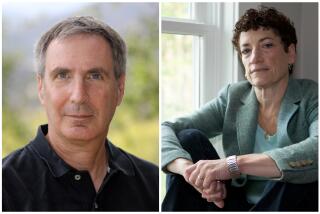The Bad News Is, We’re History
- Share via
Osama bin Laden has declared war on the modern West and branded us infidels. Everything we love--freedom, tolerance, easy relations between the sexes, individualism, equal opportunity, prosperity--gives proof of our deviation from his standard of purity.
This puzzles us because we assumed that we knew all about resistance to modern ways. The Age of Enlightenment--when Diderot, Voltaire, Paine, Franklin and Jefferson glimpsed a new kind of society to replace the hierarchical regimes that tortured heretics, suppressed free thought and debased the dignity of ordinary men and women--was 200 years ago. From this experience, we thought we had a script for the world. We had been there, done that.
Those 18th century warriors for modernity sized up their enemies accurately: decadent and corrupt governments, repressive religions and a populace ground down by poverty and ignorance. They deconstructed sacred texts, hereditary privilege and yearnings for a past golden age to make room for liberty, equality and fraternity with space left over for mobility and prosperity.
From this combustible intellectual material came the explosion of the French Revolution and the wars that swept across Europe from 1792 to 1815. When the dust settled, Europe had organized itself into nations instead of monarchies. Modern perspectives intruded on all traditional institutions, including the family. Those who loved the past were labeled reactionaries and confined to minority politics.
On the basis of this progressive view of history, political analyst Francis Fukuyama, in his 1992 book “The End of History and the Last Man,” proclaimed the collapse of the Soviet Union as the last chapter of history as we knew it. In Fukuyama’s view, there were no longer any significant cultural differences to deflect the direction of history. The book now seems emblematic of a Western ethnocentrism that has breathed its last gasp.
Muslim culture is not Western culture 300 years earlier. Its bias against individual autonomy and self-interested economic exchanges runs deep. Sexual relations, so basic to all social organizations, are ordered along entirely different principles. And there is another difference even more portentous: Not all moderate Muslim states have enjoyed the commercial prosperity that rewarded the advanced countries in Europe in the 18th and 19th centuries.
An enormous increase in the capacity to produce wealth accompanied the reforms that modernized Europe and North America. Then Western science teamed up with new technologies to revolutionize the production of goods and the organization of labor. Enterprise, pushing hard on old ways of doing business, transformed the practical realities of everyday life. Champions of democracy, toleration and the abolition of slavery drew support from the wealth generated by industry.
In addition, population pressures abated in Europe after the 18th century, while populations continue to go up in contemporary Middle Eastern countries, most of which have a mean age of 16, compared with 30 in the West.
Far from being at the end of history, we are moving into an unknown future. This has always been the case, but our theories about what lies ahead had lulled us into a sense that we were in charge of the narrative of modernity.
Since Sept. 11, we know differently. No longer can we rely on the conspicuous benefits of health, longevity and prosperity to win over others.
We’re back in history, real history, bereft of confidence in our capacity to predict how others will respond to modernity’s lures.
More to Read
Sign up for our Book Club newsletter
Get the latest news, events and more from the Los Angeles Times Book Club, and help us get L.A. reading and talking.
You may occasionally receive promotional content from the Los Angeles Times.







